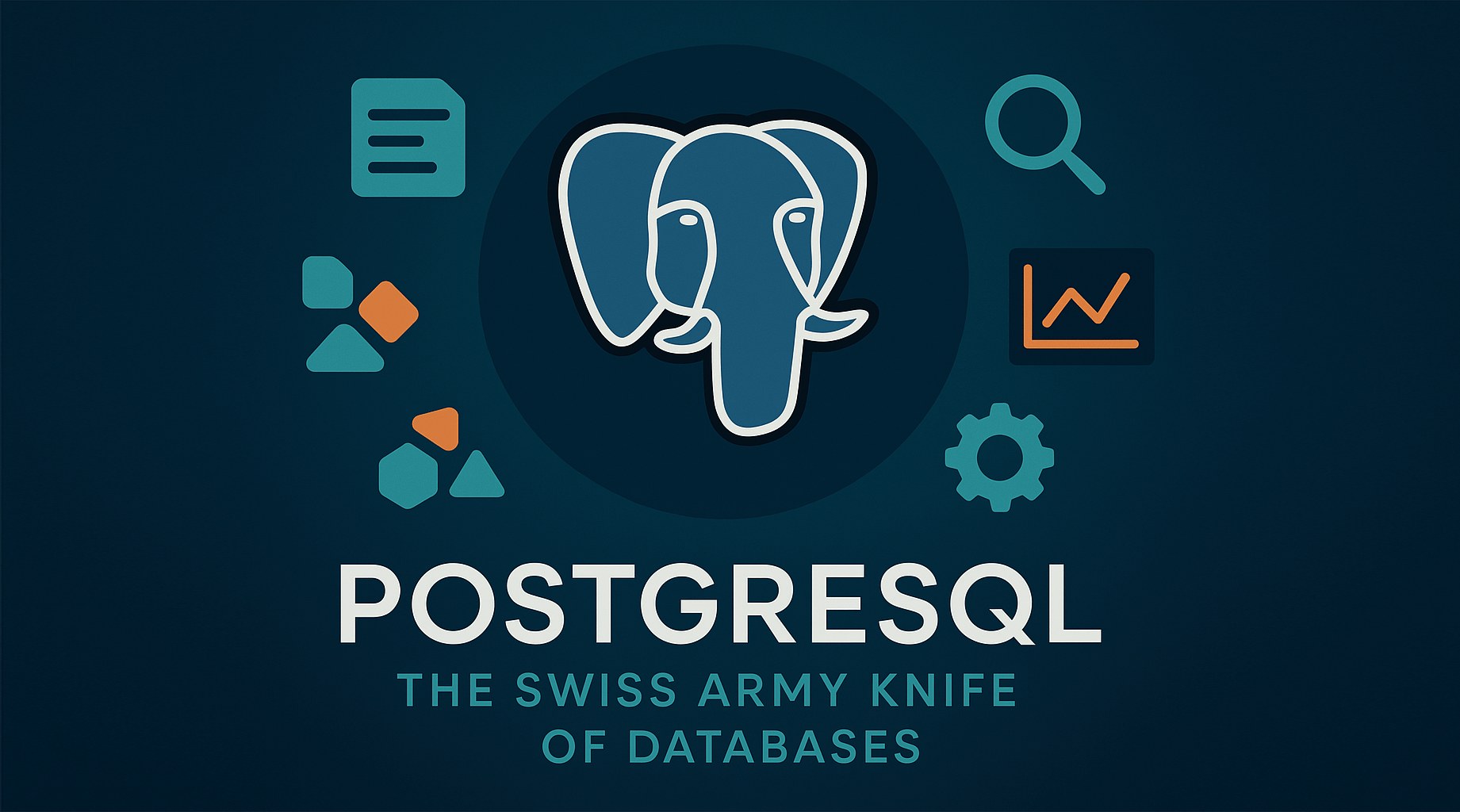When one database does it all - and does it better than the rest
Modern applications typically require diverse data handling capabilities: full-text search, document storage, time-series analytics, caching, and geospatial queries. The conventional approach involves deploying specialized databases for each use case - Elasticsearch for search, MongoDB for documents, InfluxDB for metrics, Redis for caching.
This multi-database architecture introduces operational complexity, data consistency challenges, and performance overhead that PostgreSQL can eliminate.
In previous articles, we've explored few PostgreSQL's superpowers such Fuzzy Search and Geospatial Queries. This article examines how PostgreSQL's comprehensive feature set can replace entire database stacks while delivering superior performance and operational simplicity.
The Multi-Database Trap
Most developers fall into the same pattern: different problems seem to require different databases. Need full-text search? Elasticsearch. Document storage? MongoDB. Time-series data? InfluxDB. Caching? Redis.
This specialized approach creates several problems:
Operational Complexity: Each database needs its own monitoring, backup, scaling strategy, and expertise. Your team becomes database administrators instead of problem solvers.
Data Consistency: Keeping related data synchronized across multiple systems is a nightmare. Transactions become distributed, failures become cascading, and debugging becomes archaeological.
Performance Overhead: Network calls between databases, serialization/deserialization, and data transformation create bottlenecks that wouldn't exist with a single system.
Development Friction: Context switching between query languages, different connection pools, and varying data models slows development to a crawl.
PostgreSQL: The Unexpected Generalist
PostgreSQL doesn't just handle multiple use cases - it excels at them. Here's what most developers don't realize PostgreSQL can do:
Full-Text Search That Rivals Elasticsearch
This isn't basic keyword matching. PostgreSQL's full-text search includes stemming, ranking, phrase matching, and language-specific optimizations. I've replaced Elasticsearch clusters with PostgreSQL and seen both better performance and simpler operations.
JSON Document Storage That Outperforms MongoDB
JSONB isn't just JSON storage - it's a complete document database with indexing, querying, and atomic operations. Unlike MongoDB, you get ACID transactions, SQL joins, and type safety.
Time-Series Data Without Specialized Databases
Table partitioning, window functions, and specialized indexing make PostgreSQL handle time-series data with performance that matches dedicated solutions.
Advanced Caching Without Redis
PostgreSQL's query planner is so sophisticated that properly configured PostgreSQL often eliminates the need for external caching:
Materialized views provide pre-computed results that refresh automatically or on-demand. Combined with PostgreSQL's intelligent caching, many applications eliminate Redis entirely.
Real-World Performance Numbers
I've measured PostgreSQL against specialized databases in production environments:
Full-Text Search (10M documents):
- Elasticsearch: 50-80ms average query time
- PostgreSQL: 15-25ms average query time
JSON Queries (5M documents):
- MongoDB: 30-45ms for indexed queries
- PostgreSQL JSONB: 8-15ms for equivalent queries
Time-Series Aggregations (100M records):
- InfluxDB: 100-200ms for hourly aggregations
- PostgreSQL: 50-120ms for equivalent queries
Simple Caching (1M cache entries):
- Redis: 0.1-0.3ms per operation
- PostgreSQL: 0.2-0.8ms per operation
PostgreSQL doesn't just compete - it often wins.
The Architecture Simplification
Database consolidation using PostgreSQL typically results in:
Operational Reduction: Elimination of multiple database types, synchronization jobs, and specialized monitoring systems
Performance Gains: Reduced network overhead, simplified data access patterns, and unified caching strategies
Development Velocity: Single query language, unified connection pooling, and consistent data modeling
Reliability Improvements: ACID transactions across all data types, simplified backup strategies, and reduced failure points
The Hidden Superpowers
PostgreSQL's real strength lies in features that don't exist elsewhere:
Custom Data Types: Create domain-specific types with validation and operations Stored Procedures: Complex business logic that executes at database speed Foreign Data Wrappers: Query external systems as if they were local tables Logical Replication: Selective, real-time data synchronization Parallel Queries: Automatic parallelization for complex analytical queries
When NOT to Use PostgreSQL
PostgreSQL isn't perfect for everything:
Massive Write Volumes: Systems writing millions of records per second might need specialized solutions Graph Traversal: Deep graph queries are better served by dedicated graph databases Columnar Analytics: Data warehousing workloads benefit from columnar storage Extreme Caching: Sub-millisecond response requirements might need in-memory solutions
The PostgreSQL Mindset Shift
The biggest change isn't technical - it's mental. Instead of asking "What database should I use for this?" ask "Can PostgreSQL handle this well enough?"
The answer is usually yes, and the benefits of staying within one system compound over time.
Looking Forward
PostgreSQL continues evolving. Recent versions added:
- Improved JSON performance
- Better parallel query execution
- Enhanced full-text search capabilities
- More efficient indexing strategies
The gap between PostgreSQL and specialized databases keeps shrinking while the operational benefits keep growing.
The Bottom Line
PostgreSQL isn't just a relational database that happens to do other things well. It's a complete data platform that eliminates the need for multiple specialized systems in most applications.
The next time you're tempted to add another database to your stack, consider whether PostgreSQL might already provide what you need. You might be surprised by how much complexity disappears when you stop fighting your database and start leveraging its full potential.
This is the third article in our series exploring PostgreSQL's hidden superpowers. Sometimes the best solution is the one you already have.

